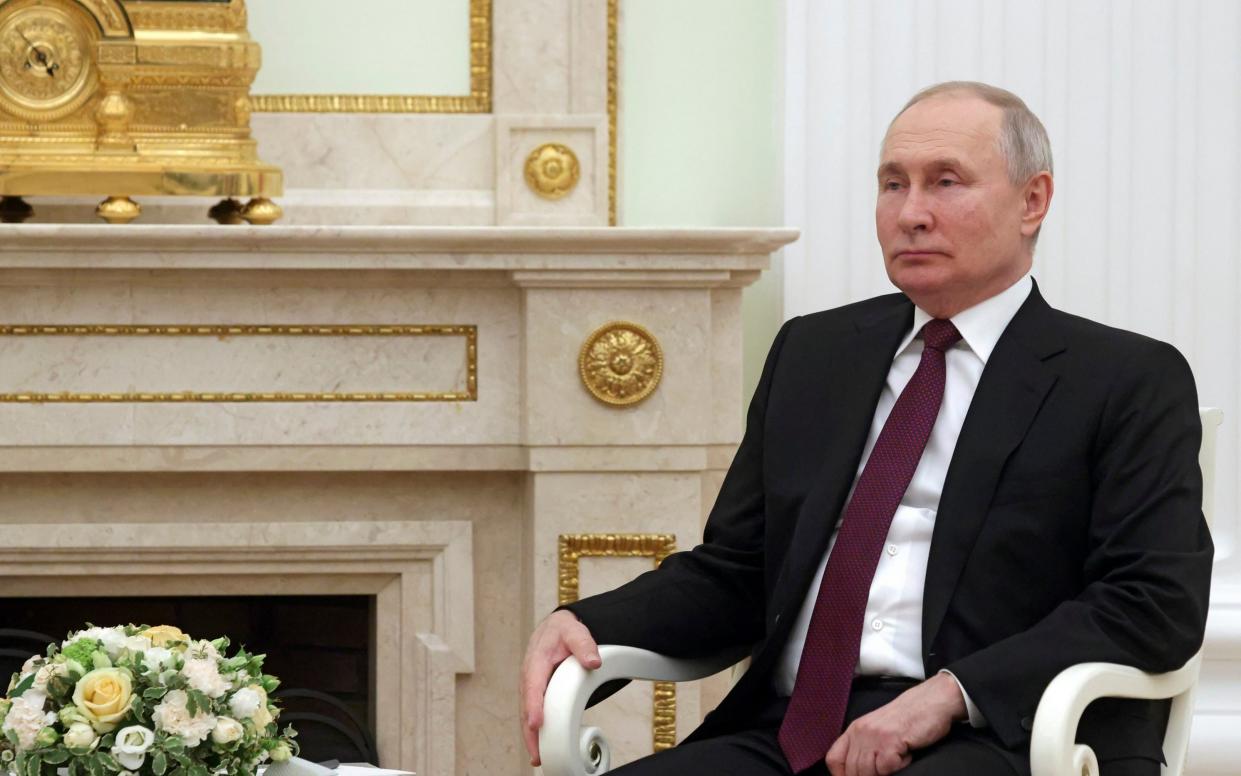Vladimir Putin’s health may be disintegrating and it should terrify us all

- Oops!Something went wrong.Please try again later.
- Oops!Something went wrong.Please try again later.
- Oops!Something went wrong.Please try again later.
Images of Putin gripping his chair and squirming next to President Xi in Moscow have again fuelled speculation about his health. He was filmed limping during a visit to Crimea a few days ago and during a February meeting with Belarus leader Alexander Lukashenko his leg was shaking uncontrollably. Since Putin invaded Ukraine last year, rumours of his physical well-being have been rife, with a range of theories from cancer to Parkinson’s.
This may amount to little more than wishful thinking that the man whose actions have led directly to the deaths of tens of thousands may be falling apart, and CIA Director William Burns said last year: “As far as we can tell, he’s entirely too healthy”.
But if we imagine, for a moment, that he is suffering from some serious affliction, then that would have big ramifications. For one, the immense stress that must press upon him could rapidly exacerbate his illness and directly affect his mental processes and judgement. Even if Burns is right, the demands of running a country in any circumstances are huge, and we’ve all seen the way many national leaders appear to age prematurely over their time in office.
The pressure cooker inside 70-year-old Putin’s head must sometimes reach bursting point after leading Russia for a quarter of a century, presiding over a war which has been going catastrophically wrong for the last year. Such a crushing burden would be tough enough for the leader of a democracy, but as ruler of the Russian autocracy Putin is well aware that his end could come in a violent death. Short of that, he will also know that he could face jail time following the arrest warrant for war crimes issued last week by the ICC. If he is deposed, it is possible a new regime in Moscow might hand him over as happened to Slobodan Milosevic in 2021.
All this will be playing on Putin’s mind, although his troubles could have been eased by a lifeline from Xi during his visit, perhaps with promises of money, weapons and sanctions busting. That will have been his hope, but it might also have gone the other way depending on Xi’s calculations of where his interests lie. China stands to gain from this war, whichever side prevails.
Whatever the truth about Putin’s state of mind, we should be prepared for him to behave with growing irrationality unless he is able to dramatically improve his fortunes on the battlefield. That is far from certain, with Kyiv reportedly gearing up for a major offensive next month.
Those around him know far better than we do about Putin’s mental state and if they perceive a dangerous deterioration, or if he becomes physically or mentally incapable, it’s possible they could seek to bring him down. That is a more likely scenario than the much-discussed possibility of a coup inspired by disaffection over the way he is running the war. Any attempt to depose Putin, especially if he resists as is likely, could lead to a violent power struggle, instability and chaos across the country and potentially even civil war with untold consequences for Russia and the world.
Another possible impact of a Putin breakdown may be even more apocalyptic. His sabre-rattling over nuclear weapons earlier in the conflict was an attempt to cow the West. But those who argue that he will never use battlefield or strategic nuclear weapons based on the logic that it could lead to retaliation that will do much greater damage to Russia than Ukraine or the West should remember we could be dealing with a man fighting for his life and increasingly devoid of logical thinking.
While the circumstances today are different, it’s worth remembering that Hitler, who had become increasingly deranged as he contemplated the collapse of his Reich, ordered the destruction of all economic, industrial, transport, military and communication facilities in Germany. As Hitler’s diabolical orders were refused, we must hope that those in Putin’s nuclear chain of command would also refuse to press the button if they were told to do so.
Hope, though, is not a strategy and as we seem to be witnessing a deterioration in Putin’s condition, it becomes increasingly urgent that Western leaders prepare for the possible consequences. Much of the burden for that falls on US and British intelligence agencies, who will already have been doing what they can to covertly influence Putin’s key nuclear players and preparing – as far as possible – to shape events in the wake of a collapse in the Kremlin, including early engagement with whatever regime emerges. That will involve a race with Beijing’s Ministry of State Security.

